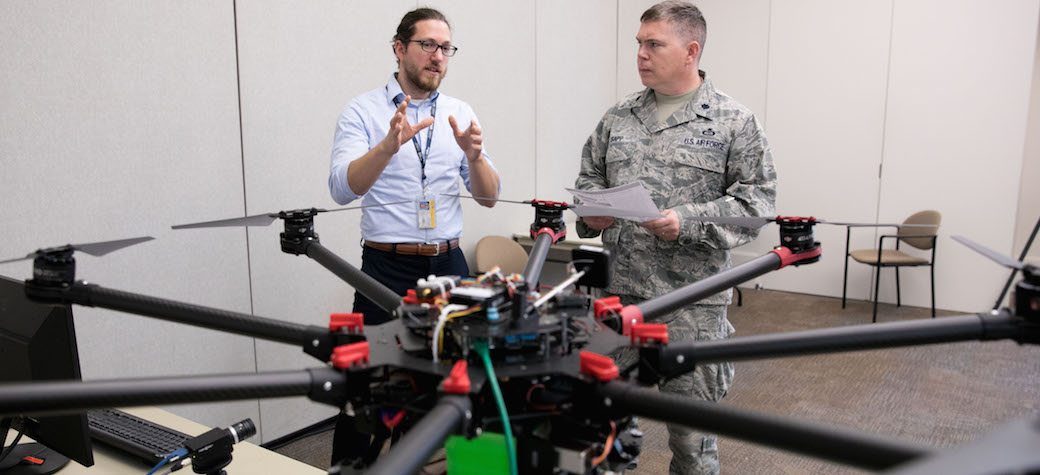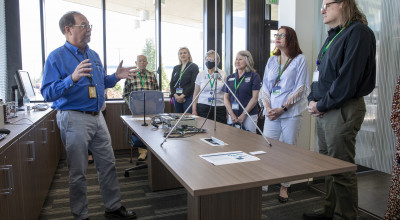
The U.S. Army Training and Doctrine Command (TRADOC) presented its Mad Scientist symposium on “Robotics, Artificial Intelligence and Autonomy” at Georgia Tech on March 7 and 8.
TRADOC’s Mad Scientist Initiative is a collaborative partnership with academia, industry and government to help anticipate and prepare for the challenges of future warfare. By exploring the operational environment of the future, the Army seeks to shape the future of warfare, rather than respond to it, and increase the rate of innovation within its branch of the military.
Different themed events call on researchers and other partners to imagine the challenges facing the Army in 2030, and provide solutions to those problems today. Lee Grubbs, director of the Mad Scientist Initiative based out of Fort Eustis, Va., said the symposium came to Georgia Tech because that’s where the experts are.
“We want to partner with leading institutions in the topic areas we are interested in,” Grubbs said. “When we wanted to discuss robotics, artificial intelligence and autonomy, we knew that Georgia Tech is one of the leading academic institutions in the country. It seemed like a natural connection.”
Researchers from the Georgia Tech Research Institute (GTRI) and Georgia Tech joined faculty from Carnegie Mellon, the University of Maryland as well as Army and industry representatives to present their research and work on robotics and machine learning.
“The opening from Dr. [Stephen] Cross really set the stage in showing what Georgia Tech does for the state, for the country and for our military,” Grubbs said. “We’ve had the best experts in robotics with Dr. Egerstedt, the best in autonomy with Dr. Pippen and the best in artificial intelligence and sensory perception with Dr. Kira.”
Speakers included the following:
- Dr. Stephen Cross, Georgia Tech Executive Vice President for Research
- Dr. Zsolt Kira, branch chief of the Advanced Machine Learning Analytics Group within the Robotics and Autonomous Systems Division at GTRI
- Dr. Charles Pippin, senior research scientist within GTRI’s Aerospace, Transportation and Advanced Systems (ATAS) Laboratory
- Dr. Magnus Egerstedt, executive director for Georgia Tech’s Institute for Robotics and Intelligent Machines
- Dr. Augustus Fountain, deputy chief scientist, Office of the Deputy Assistant Secretary of the Army (Research & Technology)
- Dr. Robert Sadowski, robotics senior research scientist, Research, Technology and Integration Director at U.S. Army TARDEC, U.S. Army Chief Roboticist
- Alexander Kott, chief scientist, U.S. Army Research Laboratory
- Juliane Gallina, director, U.S. Federal Solutions, IBM Watson
- Dr. Gary Ackerman, University of Maryland, National Consortium for the Study of Terrorism and Responses to Terrorism
During the two-day event, attendees were encouraged to attend a robotics “petting zoo,” where they were afforded a close-up look at some autonomous vehicles and other examples of artificial intelligence, machine sensing and machine learning.
IBM Watson representatives showed off the ability for Watson to communicate and parse native human language, even detecting the “sentiment” behind the statements.
Georgia Tech researchers are working on several items, including:
- A low-powered brachiating robot that swings by its “arms” to monitor plants in a field.
- A 25-pound, helicopter-type unmanned aerial vehicle (UAV) that can deliver up to 65 pounds of payload in the field.
- A combined LIDAR with a UAV to map areas, seeking changes to the environment, people’s walking habits, and reconstructing static and dynamic objects in three-dimensional space.
More than 100 registered and attended, including representatives from NATO, South Korea and from several other European countries. More than 200 watched the event at any given time online from around the world, and even were participating in live chatrooms during the event. All of the content will be posted on the TRADOC G-2 OE Enterprise YouTube page.




